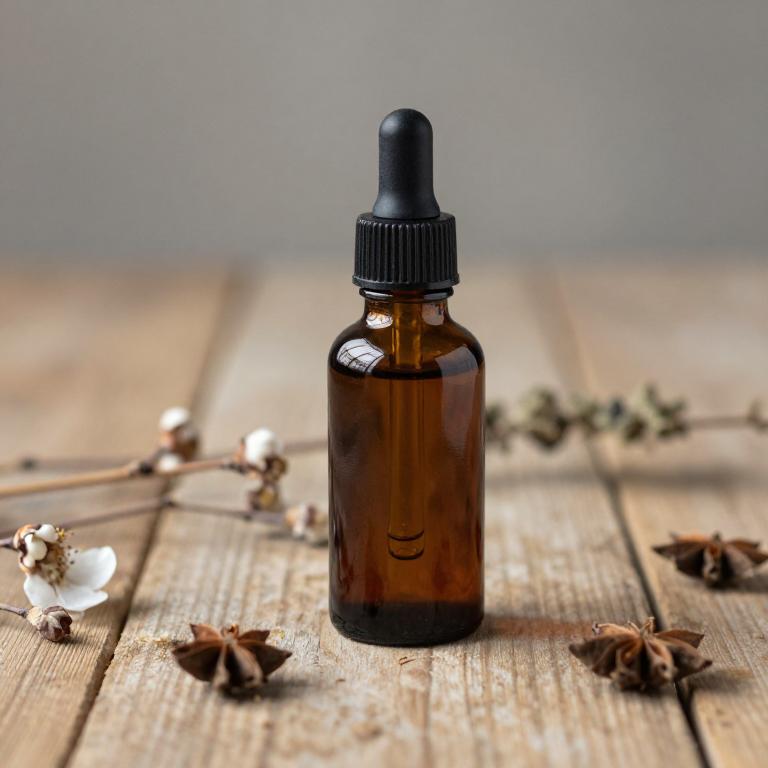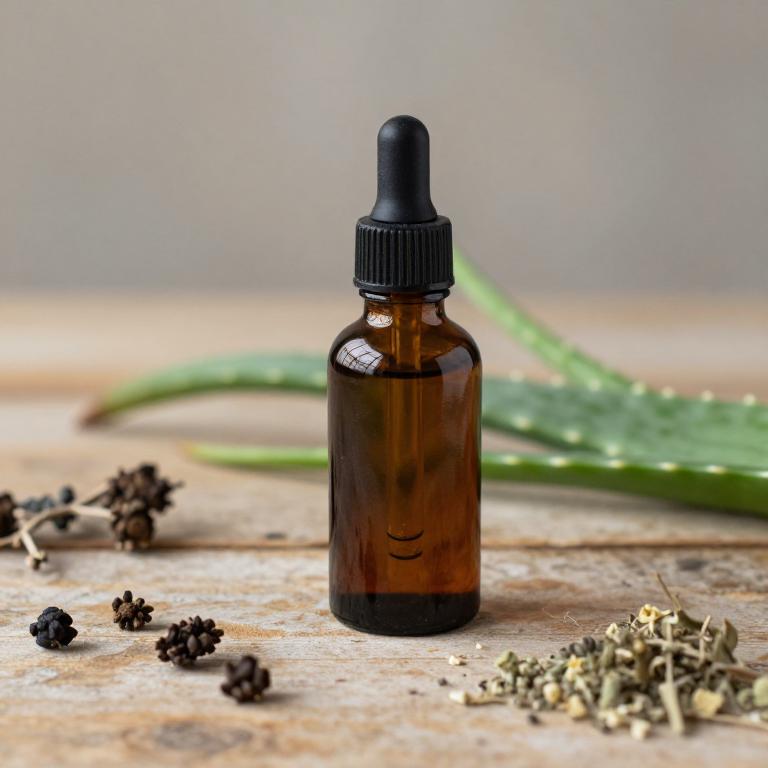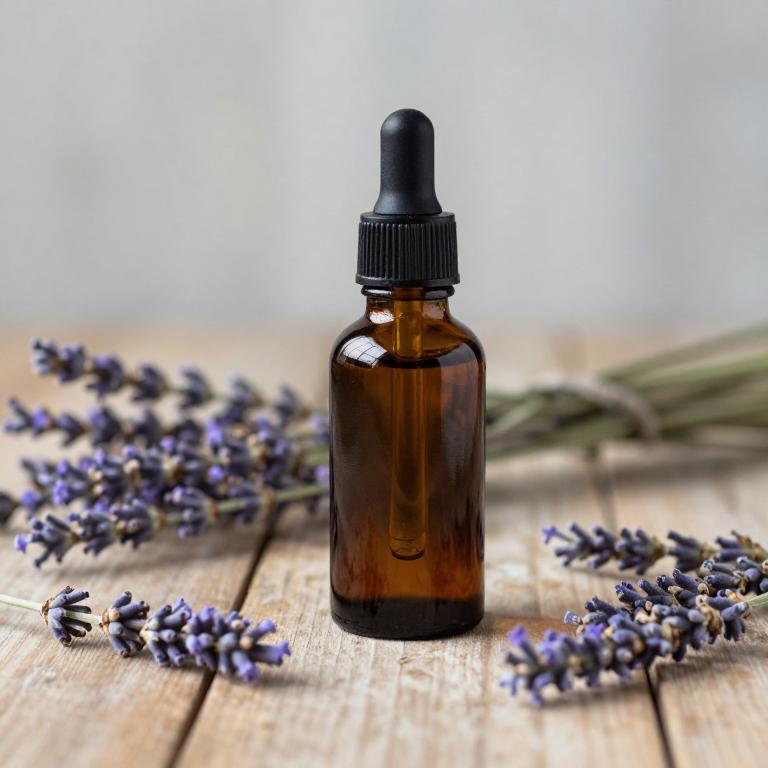10 Best Herbal Tinctures For Dry Lips

Herbal tinctures for dry lips are concentrated liquid extracts made from natural herbs known for their moisturizing and soothing properties.
Common ingredients include calendula, chamomile, lavender, and licorice root, which help to hydrate and protect the delicate skin on the lips. These tinctures are typically applied directly to the lips using a clean applicator or cotton swab for quick relief from chapping and cracking. They are a natural alternative to commercial lip balms, offering a calming and nourishing effect without harsh chemicals.
Regular use of herbal tinctures can help maintain soft, healthy lips by promoting healing and reducing inflammation.
Table of Contents
- 1. Marigold (Calendula officinalis)
- 2. Ginger (Zingiber officinale)
- 3. St. john's wort (Hypericum perforatum)
- 4. European plum (Prunus domestica)
- 5. Dog rose (Rosa canina)
- 6. Aloe vera (Aloe barbadensis)
- 7. English lavender (Lavandula angustifolia)
- 8. Echinacea (Echinacea purpurea)
- 9. Stinging nettle (Urtica dioica)
- 10. Salvia (Salvia officinalis)
1. Marigold (Calendula officinalis)

Calendula officinalis herbal tinctures are a natural and soothing remedy for dry lips, derived from the dried petals of the marigold plant.
These tinctures are known for their anti-inflammatory and moisturizing properties, which help to soothe irritation and promote healing of chapped skin. The active compounds in calendula, such as flavonoids and triterpenes, contribute to its ability to nourish and protect the lips from environmental stressors. When applied topically, calendula tinctures can provide a gentle, non-greasy layer that locks in moisture and enhances lip hydration.
They are particularly beneficial for individuals with sensitive skin or those seeking a natural alternative to commercial lip balms.
2. Ginger (Zingiber officinale)

Zingiber officinale, commonly known as ginger, is a versatile herb that has been used for centuries in traditional medicine for its warming and soothing properties.
When used in the form of a tincture, ginger can provide relief for dry lips by promoting circulation and hydration to the delicate skin. The active compounds in ginger, such as gingerol and shogaol, have anti-inflammatory and antioxidant effects that help reduce irritation and redness. To use ginger tincture for dry lips, a few drops can be applied directly to the affected area using a clean applicator or a cotton swab.
While generally safe, it is advisable to perform a patch test first to check for any allergic reactions, as some individuals may be sensitive to essential oils or alcohol in the tincture formulation.
3. St. john's wort (Hypericum perforatum)

Hypericum perforatum, commonly known as St. John's Wort, is a herbal plant that has been traditionally used for its soothing and healing properties.
When used in the form of a tincture, it can be applied topically to dry lips to provide relief and promote healing. The tincture contains compounds like hyperforin and flavonoids, which may help reduce inflammation and moisturize the skin. It is often recommended for those seeking natural remedies for chapped or cracked lips due to its mild antiseptic and regenerative effects.
However, it is important to consult with a healthcare provider before use, especially if you are on medication, as St. John's Wort can interact with certain drugs.
4. European plum (Prunus domestica)

Prunus domestica, commonly known as the European plum, is used in herbal tinctures to soothe and moisturize dry lips due to its high content of vitamins and antioxidants.
These tinctures are often made by steeping the dried fruit in alcohol to extract beneficial compounds such as flavonoids and essential oils. The natural oils in Prunus domestica help to create a protective barrier on the lips, reducing moisture loss and promoting healing. When applied regularly, these tinctures can alleviate chapping and irritation while nourishing the skin.
However, it is important to dilute the tincture properly before use to avoid potential irritation from the alcohol content.
5. Dog rose (Rosa canina)

Rosa canina, also known as rosehip, is a powerful herbal remedy that has been used for centuries to nourish and soothe dry lips.
The tinctures made from Rosa canina berries are rich in essential fatty acids, vitamins A and C, and antioxidants, which help to hydrate and repair damaged lip tissue. These tinctures work by promoting skin regeneration and improving the overall texture of the lips, making them an effective natural remedy for chapped and dry lips. When applied topically, Rosa canina tinctures can provide long-lasting moisture and protection against environmental stressors.
For best results, it is recommended to use the tincture regularly as part of a daily skincare routine for the lips.
6. Aloe vera (Aloe barbadensis)

Aloe barbadensis, commonly known as aloe vera, is a versatile herbal plant widely used in natural remedies, including tinctures designed for dry lips.
These tinctures are formulated to provide deep hydration and nourishment, helping to soothe and repair chapped or cracked lips. Aloe vera contains essential nutrients like vitamins A, C, and E, as well as minerals and antioxidants that promote skin healing and moisture retention. The gentle nature of aloe tinctures makes them suitable for daily use without causing irritation, making them an ideal choice for those with sensitive skin.
Regular application of aloe barbadensis tinctures can improve the overall health and appearance of lips, leaving them soft, smooth, and visibly rejuvenated.
7. English lavender (Lavandula angustifolia)

Lavandula angustifolia, commonly known as English lavender, is widely used in herbal tinctures for its soothing and moisturizing properties.
These tinctures are particularly beneficial for dry lips due to their high concentration of essential oils and anti-inflammatory compounds. The calming aroma of lavender also provides a pleasant sensory experience while applying the tincture. When applied topically, the tincture helps to hydrate and protect the lips from further dryness and irritation.
Regular use of lavender tinctures can promote healing and maintain soft, smooth lips, making it a natural and effective remedy for lip care.
8. Echinacea (Echinacea purpurea)

Echinacea purpurea herbal tinctures are traditionally used for their potential immune-boosting properties, but they can also be beneficial for dry lips due to their anti-inflammatory and moisturizing effects.
These tinctures contain compounds like alkamides and flavonoids that may help soothe and hydrate the skin, including the delicate lip area. When applied topically, echinacea tinctures can provide a protective barrier that locks in moisture and reduces flakiness. However, it's important to dilute the tincture with a carrier oil or water to avoid irritation, as undiluted use may cause dryness or allergic reactions.
While echinacea is generally safe for topical use, individuals with sensitive skin should perform a patch test before applying it to their lips.
9. Stinging nettle (Urtica dioica)

Urtica dioica, commonly known as stinging nettle, is a potent herb that has been traditionally used for its soothing and healing properties.
When prepared as a tincture, it can be applied topically to dry lips to provide relief and promote hydration. The tincture works by delivering anti-inflammatory and astringent compounds that help reduce irritation and restore the skin’s natural moisture balance. Its high content of vitamins and minerals also supports tissue repair and enhances the lips' resilience.
However, it is important to dilute the tincture properly and perform a patch test before applying it to the lips to avoid any potential adverse reactions.
10. Salvia (Salvia officinalis)

Salvia officinalis, commonly known as sage, is often used in herbal tinctures for its soothing and healing properties.
These tinctures can be applied topically to dry lips to provide moisture and promote healing by reducing inflammation and irritation. Sage contains essential oils and antioxidants that help to nourish and protect the delicate skin of the lips. When diluted properly, sage tinctures can be safely used as a natural remedy for chapped or cracked lips.
However, it is important to consult with a healthcare professional before using any herbal tincture, especially if you have sensitive skin or existing health conditions.